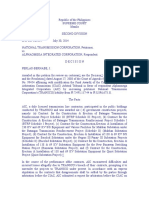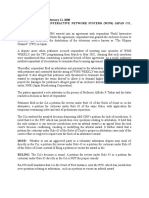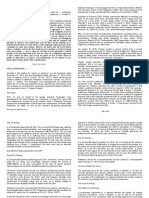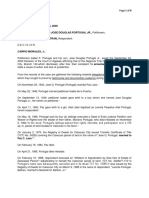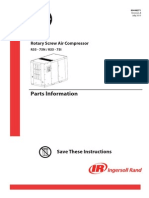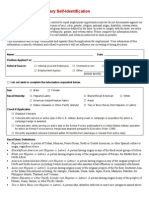Philippine Transmarine Carriers, Inc., Carlos C. Salinas, and Norwegian CREW MANAGEMENT A/S, Petitioners, v. CESAR C. PELAGIO, Respondent
Philippine Transmarine Carriers, Inc., Carlos C. Salinas, and Norwegian CREW MANAGEMENT A/S, Petitioners, v. CESAR C. PELAGIO, Respondent
Uploaded by
LarissaOriginal Description:
Original Title
Copyright
Available Formats
Share this document
Did you find this document useful?
Is this content inappropriate?
Report this DocumentCopyright:
Available Formats
Philippine Transmarine Carriers, Inc., Carlos C. Salinas, and Norwegian CREW MANAGEMENT A/S, Petitioners, v. CESAR C. PELAGIO, Respondent
Philippine Transmarine Carriers, Inc., Carlos C. Salinas, and Norwegian CREW MANAGEMENT A/S, Petitioners, v. CESAR C. PELAGIO, Respondent
Uploaded by
LarissaCopyright:
Available Formats
PHILIPPINE TRANSMARINE CARRIERS, INC., CARLOS C.
SALINAS, AND NORWEGIAN
CREW MANAGEMENT A/S, Petitioners, v. CESAR C. PELAGIO, Respondent.
Petitioner hired Pelagio as a Motorman on board the vessel MN Drive Mahone for a period of 6
months. Pelagio experienced difficulty in breathing and pains on the nape, lower back, and
joints while at work. Pelagio was then referred to a port doctor in Egypt where he was declared
unfit to work. Pelagio was repatriated back to the Philippines for further medical treatment. After
a series of medical and laboratory examinations, Pelagio was assessed by the company-
designated physician with a disability rating of Grade 11 - "slight loss of lifting power of the
trunk." Pelagio sought a second opinion from a private orthopedic surgeon physician who
declared him permanently unfit to work in any capacity at his previous occupation. Pelagio
sought payment of permanent total disability benefits from petitioners, but to no avail. Hence, he
filed a complaint before the Arbitration Branch of the NLRC. The LA found that Pelagio was
suffering from a permanent partial disability and ordered petitioners to pay. The NLRC reversed
and set aside the LA ruling, and accordingly, awarded Pelagio the amount equivalent at the time
of actual payment representing permanent total disability benefits and attorney's fees. After the
motion for reconsideration was dismissed, petitioners filed a petition for certiorari. During the
pendency of the certiorari proceedings, the parties executed a Satisfaction of Judgment dated
stating that petitioners had already paid the full and complete satisfaction of the NLRC ruling.
However, it is likewise stated therein that such satisfaction of judgment is without prejudice to
the petition for certiorari pending with the CA and that the same was being made only to prevent
imminent execution. On even date, Pelagio likewise executed a Receipt of Payment and an
Affidavit of Claimant. The NLRC issued an Order approving the settlement and considered the
case closed and terminated. The CA dismissed the certiorari petition, ruling that the Satisfaction
of Judgment executed by the parties is in the nature of a compromise agreement, which was
properly approved by the NLRC, as it did not contravene any law, morals, public policy, or public
order.
Issue
whether or not the execution of the Satisfaction of Judgment between the parties rendered
the certiorari proceedings before the CA moot and academic.
Held
Yes, the CA erred in dismissing the certiorari petition.A compromise agreement is a contract
whereby the parties, by making reciprocal concessions, avoid a litigation or put an end to one
already commenced. A valid compromise agreement may render a pending case moot and
academic. However, the parties may opt to put therein clauses, conditions, and the like that
would prevent a pending case from becoming moot and academic - such as when the execution
of such agreement is without prejudice to the final disposition of the said case. After all, a
compromise agreement is still a contract by nature, and as such, the parties are free to insert
clauses to modify its legal effects, so long as such modifications are not contrary to law, morals,
good customs, public order, or public policy.47cralawrednad
Since the agreement in that case was fair to the parties in that it provided available remedies to
both parties, the certiorari petition was not rendered moot despite the employer's satisfaction of
the judgment award, as the respondent had obliged himself to return the payment if the petition
would be granted.
You might also like
- Caire Claim CaseDocument1 pageCaire Claim CaseLarissa100% (2)
- Tally's Blood Character SketchesDocument2 pagesTally's Blood Character SketchesAlexFrielNo ratings yet
- Impact of Europeans On The Indigenous PeopleDocument13 pagesImpact of Europeans On The Indigenous PeopleDance-Off 15No ratings yet
- The Execution of Dr. Jose RizalDocument4 pagesThe Execution of Dr. Jose RizalJonathan Delos SantosNo ratings yet
- Sovereign's Guide For DummysDocument15 pagesSovereign's Guide For DummysNelson PaynterNo ratings yet
- Sample Separation AgreementDocument4 pagesSample Separation AgreementJemima E. Garcia100% (1)
- Ong Vs PeopleDocument2 pagesOng Vs PeopleArah Salas PalacNo ratings yet
- The Manila Electric Railroad and Light Company VDocument3 pagesThe Manila Electric Railroad and Light Company VMicaellaNo ratings yet
- Court of Appeals, Hammonia Marine Services, and Hanseatic Shipping Co., LTDDocument3 pagesCourt of Appeals, Hammonia Marine Services, and Hanseatic Shipping Co., LTDPeng ManiegoNo ratings yet
- 2nd Batch Digests CivproDocument37 pages2nd Batch Digests CivproJerik SolasNo ratings yet
- Alindao V JosonDocument9 pagesAlindao V Josonsoul and spiritNo ratings yet
- 06 MC ENGINEERING v. NLRC (FERRER) PDFDocument2 pages06 MC ENGINEERING v. NLRC (FERRER) PDFTon RiveraNo ratings yet
- NTC Vs AlphaomegaDocument11 pagesNTC Vs AlphaomegaMaria Margaret MacasaetNo ratings yet
- Do 237 22Document5 pagesDo 237 22Agent BlueNo ratings yet
- ARSENIO LOCSIN Versus NISSAN CAR LEASE PHILIPPINES INCORPORATEDDocument1 pageARSENIO LOCSIN Versus NISSAN CAR LEASE PHILIPPINES INCORPORATEDCeresjudicataNo ratings yet
- Concepcion V Minex Import CorporationDocument4 pagesConcepcion V Minex Import CorporationAnonymous wbEpfdMNo ratings yet
- GUAGUA NATIONAL COLLEGES V CADocument2 pagesGUAGUA NATIONAL COLLEGES V CAKatrina San Miguel100% (1)
- Philtranco Vs NLRCDocument1 pagePhiltranco Vs NLRCJulian DubaNo ratings yet
- Rule 16, Sec. 1, Morata v. Go, 125 SCRA 444 (1983)Document3 pagesRule 16, Sec. 1, Morata v. Go, 125 SCRA 444 (1983)Vance Ceballos100% (2)
- Sales - Finals (Digests)Document10 pagesSales - Finals (Digests)oniksukkieNo ratings yet
- ISSUE: W/N The CFI Validly Dismissed The Case On The Ground of The Plaintiff's FailureDocument1 pageISSUE: W/N The CFI Validly Dismissed The Case On The Ground of The Plaintiff's FailureMartin FontanillaNo ratings yet
- Sps. Buenaventura Et Al. vs. CADocument2 pagesSps. Buenaventura Et Al. vs. CADanica CaballesNo ratings yet
- Sun Life of Canada Vs Sandra TanDocument4 pagesSun Life of Canada Vs Sandra TanDali MaliamanNo ratings yet
- PAMACOvs REPUBLICDocument2 pagesPAMACOvs REPUBLICFred GoNo ratings yet
- ADR - Diaz Vs Judge Gestopa JRDocument2 pagesADR - Diaz Vs Judge Gestopa JREdwin VillaNo ratings yet
- Pabon, Et Al., vs. NLRC and Senior Marketing Corp., G.R. No. 120457 (Sep. 24, 1998)Document1 pagePabon, Et Al., vs. NLRC and Senior Marketing Corp., G.R. No. 120457 (Sep. 24, 1998)Jolynne Anne GaticaNo ratings yet
- Hacienda Cataywa Vs LorenzoDocument1 pageHacienda Cataywa Vs LorenzoEANo ratings yet
- 40 - Aboitiz v. CAGLIDocument3 pages40 - Aboitiz v. CAGLIannmirandaNo ratings yet
- Digested Case in Labor RelationsDocument37 pagesDigested Case in Labor RelationsLawstudes100% (2)
- Magbanua Et. Al. v. Uy G.R. No. 161003Document2 pagesMagbanua Et. Al. v. Uy G.R. No. 161003Patrick HilarioNo ratings yet
- PersonsDocument1 pagePersonsDowie M. MatienzoNo ratings yet
- 35 GR No. 182295 7K Corporation Vs Albarico Jurisdiction 1Document2 pages35 GR No. 182295 7K Corporation Vs Albarico Jurisdiction 1Antonio BartolomeNo ratings yet
- Mesina v. IAC (Digest)Document2 pagesMesina v. IAC (Digest)Tini Guanio0% (1)
- Magbanua VS Uy Case-DigestDocument2 pagesMagbanua VS Uy Case-DigestAnonymous WodBtjjNtB100% (1)
- Apalisok vs. RadioDocument2 pagesApalisok vs. RadioJas Mine100% (1)
- Del Monte v. SaldivarDocument2 pagesDel Monte v. SaldivarPaula Pulido100% (1)
- World Best GasDocument3 pagesWorld Best GasHoven MacasinagNo ratings yet
- Case No. 31, Jurisprudence - Ace Navigation Vs FernandezDocument2 pagesCase No. 31, Jurisprudence - Ace Navigation Vs FernandezCharles Kevin Caparas Absalon0% (1)
- Bitlex Phils. Labor Union (NAFLU) v. Filflex Industrial and Manufacturing Corp DigestDocument1 pageBitlex Phils. Labor Union (NAFLU) v. Filflex Industrial and Manufacturing Corp DigestReyn ArcenalNo ratings yet
- Art. 225 CasesDocument11 pagesArt. 225 CasesIvan LuzuriagaNo ratings yet
- Philippine Journalists Inc. v. de GuzmanDocument2 pagesPhilippine Journalists Inc. v. de GuzmanKobe Lawrence VeneracionNo ratings yet
- 7k Corp Vs AlbaricoDocument2 pages7k Corp Vs Albaricor_respicioNo ratings yet
- Levi Strauss v. Clinton AparelleDocument2 pagesLevi Strauss v. Clinton AparellejexabejeroNo ratings yet
- PENINSULA EMPLOYEES UNION Vs EsquivelDocument2 pagesPENINSULA EMPLOYEES UNION Vs EsquivelChap ChoyNo ratings yet
- Nagarmull Vs Binalbagan Isabela Case DigestDocument7 pagesNagarmull Vs Binalbagan Isabela Case DigestRosanne SoliteNo ratings yet
- Frabelle Fishing V PhilAmDocument1 pageFrabelle Fishing V PhilAmMarc VirtucioNo ratings yet
- Divine Word High School Vs NLRCDocument3 pagesDivine Word High School Vs NLRCVince LeidoNo ratings yet
- Tan Tiong Bio V BirDocument3 pagesTan Tiong Bio V BirKylie Kaur Manalon DadoNo ratings yet
- Civpro Digests Cases 12-17Document17 pagesCivpro Digests Cases 12-17Liaa AquinoNo ratings yet
- Republic of The Philippines and National Power Corporation v. Sunvar RealtyDocument2 pagesRepublic of The Philippines and National Power Corporation v. Sunvar RealtyKrisha Marie CarlosNo ratings yet
- Paper Industries Corporation of The Philippines V LaguesmaDocument2 pagesPaper Industries Corporation of The Philippines V LaguesmaJenny Mary DagunNo ratings yet
- Title MC Engineering, Inc. v. NLRC: G.R. No. 142314Document2 pagesTitle MC Engineering, Inc. v. NLRC: G.R. No. 142314Rochelle Joy SolisNo ratings yet
- ADR Case DigestDocument12 pagesADR Case DigestAlianimamsampornaNo ratings yet
- 3 Ellao vs. Batangas I Electric Cooperative, Inc. (BATELEC I), 871 SCRA 227, G.R. No.Document6 pages3 Ellao vs. Batangas I Electric Cooperative, Inc. (BATELEC I), 871 SCRA 227, G.R. No.ekangNo ratings yet
- G.R. No. 181475 Case DigestDocument3 pagesG.R. No. 181475 Case DigestKenshin HealerNo ratings yet
- Reyes Vs Trajano - CDDocument1 pageReyes Vs Trajano - CDLinus ReyesNo ratings yet
- Apostol To EDCADocument39 pagesApostol To EDCALeo TumaganNo ratings yet
- Abs-Cbn vs. World Interactive Network Systems (Wins)Document2 pagesAbs-Cbn vs. World Interactive Network Systems (Wins)Aaron AristonNo ratings yet
- Montaño v. VercelesDocument6 pagesMontaño v. VercelesdannielamorinNo ratings yet
- Equitable PCI Banking Corporation v. RCBC Capital CorporationDocument1 pageEquitable PCI Banking Corporation v. RCBC Capital Corporationdwight yuNo ratings yet
- Geronimo v. Pascual (Petitioner)Document4 pagesGeronimo v. Pascual (Petitioner)Frances Angela A. Estipona100% (1)
- Rule 16 G.R. No. 168979Document2 pagesRule 16 G.R. No. 168979Crizel Mae MansinadezNo ratings yet
- Arbitration Set 5Document82 pagesArbitration Set 5John Adrian MaulionNo ratings yet
- Philippine Transmarine Carriers vs. Norwegian CrewDocument16 pagesPhilippine Transmarine Carriers vs. Norwegian CrewAira Mae P. LayloNo ratings yet
- 4 Stolt-Nielsen Transportation Group, Inc. v. Medequillo, JR., GR 177498, Jan. 18, 2012, 663 SCRA 291Document3 pages4 Stolt-Nielsen Transportation Group, Inc. v. Medequillo, JR., GR 177498, Jan. 18, 2012, 663 SCRA 291Kharol EdeaNo ratings yet
- Sarocam vs. InterorientDocument5 pagesSarocam vs. InterorientferosiacNo ratings yet
- Assigned Cases Outline 5 (ADDITIONAL) Guy Vs GuyDocument21 pagesAssigned Cases Outline 5 (ADDITIONAL) Guy Vs GuyLarissaNo ratings yet
- Lockerbie Case (Libya V Us) Facts: Pan Am Flight 103 Exploded On 21 December 1988 Over Lockerbie (Scotland) - Charges Were BroughtDocument2 pagesLockerbie Case (Libya V Us) Facts: Pan Am Flight 103 Exploded On 21 December 1988 Over Lockerbie (Scotland) - Charges Were BroughtLarissaNo ratings yet
- TORTS - First Week CasesDocument50 pagesTORTS - First Week CasesLarissaNo ratings yet
- Western Sahara CaseDocument1 pageWestern Sahara CaseLarissaNo ratings yet
- Will DgestsDocument23 pagesWill DgestsLarissaNo ratings yet
- Cambodia V ThailandDocument1 pageCambodia V ThailandLarissaNo ratings yet
- Camauco CaseDocument2 pagesCamauco CaseLarissa100% (1)
- Digests WillsDocument13 pagesDigests WillsLarissaNo ratings yet
- Holy See V RosarioDocument2 pagesHoly See V RosarioLarissaNo ratings yet
- ACTI V ECHINDocument2 pagesACTI V ECHINLarissaNo ratings yet
- Jean-Baptiste Caire ClaimDocument1 pageJean-Baptiste Caire ClaimLarissaNo ratings yet
- Election DigestsDocument48 pagesElection DigestsLarissaNo ratings yet
- Republic V VinzonDocument2 pagesRepublic V VinzonLarissaNo ratings yet
- Acti V Echin Topic: Immunity From Jurisdiction FACTS: Josefina Echin (Respondent) Was Hired by Petitioner ATCI Overseas Corporation in Behalf of ItsDocument2 pagesActi V Echin Topic: Immunity From Jurisdiction FACTS: Josefina Echin (Respondent) Was Hired by Petitioner ATCI Overseas Corporation in Behalf of ItsLarissaNo ratings yet
- Boac V CadapanDocument2 pagesBoac V CadapanLarissaNo ratings yet
- Be It Enacted by The Senate and House of Representatives of The Philippines in Congress AssembledDocument30 pagesBe It Enacted by The Senate and House of Representatives of The Philippines in Congress AssembledLarissaNo ratings yet
- Portugal vs. PortugalDocument8 pagesPortugal vs. PortugalGilbert YapNo ratings yet
- School Presentation KING ARTHURDocument2 pagesSchool Presentation KING ARTHURancutzsaNo ratings yet
- TLWRDocument2 pagesTLWRDanica AsaNo ratings yet
- The Soter Group - 2023 Cyber Security Conference CalendarDocument14 pagesThe Soter Group - 2023 Cyber Security Conference CalendarThe Soter Group, LLCNo ratings yet
- Pageant ScoreSheetDocument13 pagesPageant ScoreSheetloriele.lantionNo ratings yet
- NPS Draft Strategic Plan PDFDocument72 pagesNPS Draft Strategic Plan PDFElizabeth WilsonNo ratings yet
- CCJS 105Document2 pagesCCJS 105Kaia ZaleskasNo ratings yet
- Medical Negligence Case (S)Document9 pagesMedical Negligence Case (S)al gulNo ratings yet
- R75i Parts Manual Comp Nuevo LaborDocument280 pagesR75i Parts Manual Comp Nuevo Laboralex100% (4)
- David Riazanov. Marx and Anglo-Russian Relations, and Other Writings.Document221 pagesDavid Riazanov. Marx and Anglo-Russian Relations, and Other Writings.Leo GanievNo ratings yet
- The Truth About Female Ejaculation Free Report1Document16 pagesThe Truth About Female Ejaculation Free Report1Thirdy HernandezNo ratings yet
- History Paper - Ferdinand Magellan AutosavedDocument3 pagesHistory Paper - Ferdinand Magellan Autosavedapi-311332887No ratings yet
- Crim Digests IIDocument37 pagesCrim Digests IIJanica Lobas50% (2)
- He Ideology of Racial Hierarchy and The Construction of The European Slave TradeDocument9 pagesHe Ideology of Racial Hierarchy and The Construction of The European Slave TradeDionisio MesyeNo ratings yet
- EEO Candidate Voluntary Self Identification Form Oct 2011Document1 pageEEO Candidate Voluntary Self Identification Form Oct 2011alext2807025No ratings yet
- On Our Voting RightsDocument25 pagesOn Our Voting RightsTimothyNo ratings yet
- Select Epistles of ST Cyprian T A Lacey 1922 PDFDocument252 pagesSelect Epistles of ST Cyprian T A Lacey 1922 PDFMaria WrightNo ratings yet
- Forging The New Era': The Temporal Politics of Xi Jinping - The DiplomatDocument10 pagesForging The New Era': The Temporal Politics of Xi Jinping - The DiplomatSunny YaoNo ratings yet
- How Successful Were HitlerDocument4 pagesHow Successful Were HitlerwilbertNo ratings yet
- GURPS VTM Clan Lore 2023Document200 pagesGURPS VTM Clan Lore 2023glenn johnston100% (1)
- Rustic Roads Advisory CommitteeDocument3 pagesRustic Roads Advisory CommitteePlanning DocsNo ratings yet
- Child Spanking Essay OutlineDocument2 pagesChild Spanking Essay OutlineAtun Mojado xdNo ratings yet
- Provisional OrdersDocument3 pagesProvisional OrdersERNEST ELACH ELEAZARNo ratings yet
- Caribbean Cultural DevelopmentDocument4 pagesCaribbean Cultural DevelopmentJaiiNo ratings yet
- 2015 Unreported Criminal Judgment IndexDocument84 pages2015 Unreported Criminal Judgment IndexSiteketa Bonifasia SihakoNo ratings yet












